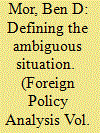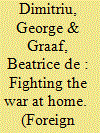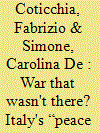|
|
|
Sort Order |
|
|
|
Items / Page
|
|
|
|
|
|
|
| Srl | Item |
| 1 |
ID:
145097


|
|
|
|
|
| Summary/Abstract |
In studies of war and terrorism, an exclusive focus on action misses an important and logically prior stage of constitutive thinking and discursive contestation. Particularly in ambiguous contexts, which states often face when waging conflict against nonstate actors such as terrorist organizations, how the situation is defined is a key to understanding state decision making and action. This paper employs symbolic interactionist theory to analyze the process of defining situations under ambiguity. It argues that how different domestic actors develop preferences for definitions depends on (i) the kind of situational parameters that they monitor as part of their group perspective, (ii) the availability of historical analogies, and (iii) (role)-identity and self-esteem needs, namely the legitimation of actors' claimed identity through an effective role performance. These ideas are examined in a case study of Israeli understanding of and response to Hizbollah's attack of July 12, 2006, which developed into the 2006 Lebanon War (known in Israel as the Second Lebanon War).
|
|
|
|
|
|
|
|
|
|
|
|
|
|
|
|
| 2 |
ID:
145094


|
|
|
|
|
| Summary/Abstract |
This paper analyzes the Dutch deployment in Uruzgan between 2006 and 2010 with an eye to the challenge of garnering public support for protracted military missions abroad. The hypothesis is that public support can be shaped and sustained by strategic narratives regarding the use of force. Ringsmose and Børgesen's model on strategic narratives is discussed and tested, and expanded in two ways. First, by including the role of “counternarratives,” that is, of narratives presented by factions that oppose deployment decisions. Our data suggest that narrative dominance (the combination of narratives and counternarratives) accounts for the waxing and waning of public support for a given mission. Second, the nexus between negative narrative dominance and the ensuing drop of public consent will be teased out. Using the notion of “elite responsiveness,” we demonstrate when and how weak strategic narratives trigger a political fallout.
|
|
|
|
|
|
|
|
|
|
|
|
|
|
|
|
| 3 |
ID:
145096


|
|
|
|
|
| Summary/Abstract |
This paper examines the domestic enablers and constraints to oversized coalition burdensharing. Using the Canadian case study, it explores the conditions under which state leaders are successful in imposing their policy preferences to a critical public, despite little tangible benefits in return. The paper develops a neoclassical realist framework which focuses on domestic determinants of alliance burdensharing, namely elite consensus, strategic culture, strategic narratives, executive autonomy, and social cohesion. This framework helps make sense of Canada's distinct case of public contestation and policy resistance by making two broad arguments. First, ineffective strategic narratives and strategic subcultures explain Canadian public opposition to Canada's combat mission. Second, an unmobilized public opinion, due to elite consensus, best accounts for Ottawa's policy unresponsiveness and hence its decision to maintain the coalition's fourth largest combat presence in Afghanistan from 2006 to 2011.
|
|
|
|
|
|
|
|
|
|
|
|
|
|
|
|
| 4 |
ID:
145095


|
|
|
|
|
| Summary/Abstract |
Factors as culture, values, and symbols are crucial to understand the evolution of the Italian foreign and defense policy. However, scholars’ attention to such variables in the study of Italian defense policies still leaves many gaps. Since the end of the Cold War, Italian troops have been constantly engaged in military operations abroad spreading a “peacekeeper image” of Italy in the international arena. The goal of this work is to investigate the features and the evolution of the main strategic narratives adopted by political leaders to interpret the Italian military involvement in Afghanistan. How have politicians crafted strategic narratives on the Afghan mission? How have these story lines influenced public opinion during the conflict? Has the disproportionate gap between the storyline, based on the traditional values of peace and multilateralism, and the war-torn reality on the ground, affected the level of public approval? Or have the ways in which narratives were built in 2009 played a more significant role? In order to answer these questions, this paper relies on polls, content analysis of parliamentary debates, and public discourse analysis (2001–2011).
|
|
|
|
|
|
|
|
|
|
|
|
|
|
|
|
| 5 |
ID:
145098


|
|
|
|
|
| Summary/Abstract |
What are the ideological sources of free trade attitudes? Free trade plays a crucial role in classical liberal theory as a way of increasing the prospects of peace between states. Are liberal individuals more supportive of free trade? The literature on foreign policy beliefs largely neglects the question of trade, and those exceptions that find support for the liberal hypothesis generally rely on faulty conceptualization. Using surveys of the American mass public and American elites, this article finds that the combination of views that marks classical liberalism does not in fact predict support for free trade at either the mass or the elite level. Support for free trade at the mass level has libertarian, not liberal, foundations, predicted by a combination of social and economic libertarianism. At the mass level, the combination of cosmopolitanism and dovishness that constitutes foreign policy liberalism has no effect on trade attitudes. At the elite level, cosmopolitanism is actually generally negatively associated with support for free trade. Free trade is a wedge issue that creates strange alliances at the elite level between cosmopolitans and isolationists generally hostile to one another on foreign policy and at the mass level between social and economic libertarians typically antagonistic to each other's domestic agenda.
|
|
|
|
|
|
|
|
|
|
|
|
|
|
|
|
|
|
|
|
|